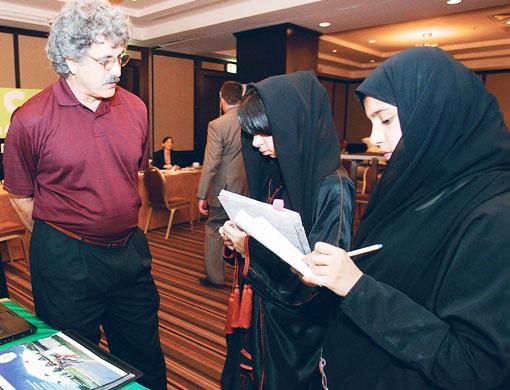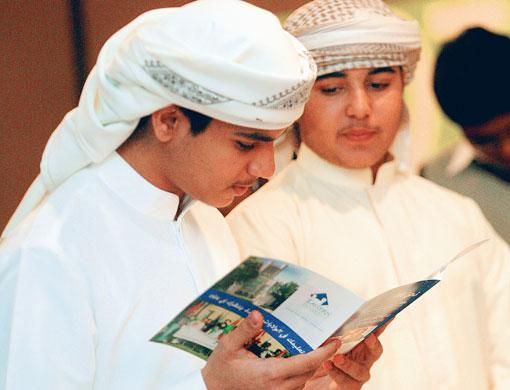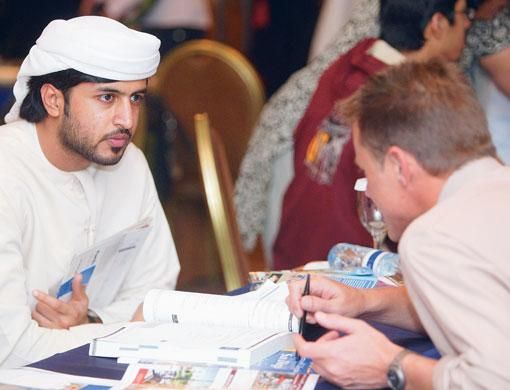While American universities are slashing budgets, firing staff and raising fees to the alarm of domestic students, international students are still determined to be educated there. Notes speaks to prospective students and admissions advisers and also looks at how American universities are reacting to the economic downturn at the ISN Education Expo held in Dubai and Abu Dhabi last week.
Attending the Malaysian campus of the Southern New Hampshire University - an American institution - for undergraduate study was Anmol Prakash's dream when she completed high school four years ago. However, due to the high costs of the American degree, amounting to about Dh60,000 per semester, she chose to study at the University of Wollongong in Dubai, which cost Dh130,000 for an entire four-year degree.
With a BCom degree in hand, the 20-year-old is now considering graduate study. An American degree would be her first choice but the student is again looking at local schools, which are affiliated with universities in Canada, Australia or India. A two-year degree at UOWD would cost her only Dh60,000, she said.
"Cost is such a big factor when you are looking at universities. I feel there is no point going abroad to study because of the recession - it becomes very expensive if you are earning in dirhams," she said.
Prakash also believes it is not worth studying abroad because the job market in the United States and other Western countries is far worse than in Dubai. "I want to work and pay for my studies while studying for my masters, so going abroad is not feasible for me. I'd much rather stay here in Dubai and work while studying."
Prakash said student loans in Dubai are also shrinking, making graduate study even more difficult to pursue, as many students do not want to burden their parents with the cost after having paid for their undergraduate degrees.
Notes spoke to marketing major Nabeel Shaikh at the ISN expo in Dubai where he was looking at American university options.
The 20-year-old Manipal University student is currently completing an internship, a requirement in his last semester, and plans to do an MBA after he gets some work experience and saves enough money for it.
Shaikh said he probably won't be able to save enough to pay for the entire degree and will take a loan from his parents. If he is still not able to afford the Dh40,000 annual tuition at an American school, he will opt for a university in India.
"The rising cost of tuition in the United States and this global recession has definitely affected my education choices and I'm really worried."
Nihdi Mehra was also at the expo and spoke about the value of an American education but said it all depended on the cost.
"It would be nice if I could find a job while studying for my masters in the US. I've got to be confident and believe in my abilities," he said.
Mehra said he is not looking at Ivy League universities - his first choice is the University of Houston, which would cost between $20,000 (Dh73,461) and $30,000 (Dh110,202).
American University of Sharjah student Shirin Shaikh is also determined to get an American degree and is not put off by escalating costs.
Shaikh, who is one of the top students in her class and a Shaikh Khalifa scholarship recipient, wants to complete her MBA at one of the top five universities in the US.
"I'm looking at university ranking rather than expenses because it is very easy to get student loans at a top university once you are accepted. I will work for two years to get work experience and save some money. My parents have also offered to loan me money for tuition."
Shaikh wants to go to Harvard University, which will cost more than Dh500,000. "I'm willing to make the sacrifice for two years. According to my research if you have a good academic record and other achievements it helps in getting discounts and it increases your chances of getting accepted."
Chin Chandran, an engineering graduate from BITS-Pilani, Dubai, is among those students whose parents will foot the bill for graduate study.
Chandran plans to attend West Texas A&M University or Iowa State University, which will cost about $30,000 (Dh110,202) per year.
"The recession has not affected my plans to study in the US. My parents are very keen on my picking the right college and price is not a huge factor compared to selecting a good college."
However, Chandran says she will try to find employment while studying to pay some of her expenses.
When Notes met with admissions advisers at the ISN Education Expo the general comment was that American universities were not raising fees drastically despite a few alarming media reports to the contrary. They also said their universities were not reducing the size or number of international student scholarships.
"There's been no decrease in the amount or number of scholarships we offer to international students due to the recession," said Heidi Englebert, coordinator of international admissions at Concordia University, Wisconsin.
She added that the university has seen an increase in international applications during the recession. "Our admissions office is more concerned about domestic students and the impact it has had on families."
John M. Mallo, international students and scholars coordinator at Northern Michigan University, said despite the recession international student applications have picked up steadily since September 11.
"For some students the recession has helped them because the US dollar is worth less now," Mallo said.
He said the university was trying to increase opportunities for international students, which include waiving the TOEFL (Test of English as a Foreign Language) exam, if the student's last year of instruction in high school was in English. Associate director of MBA admissions Craig Hubbell at UCLA's Anderson School of Management said scholarships will still be available for top applicants, but in the current economic scenario people are finding it harder to get loans through banks and other lenders.
However, he added, "The lenders are telling us that because our students are not a great credit risk and are people of strong character who get great jobs after graduation, they will be able to pay back their loans."
Some lenders have pulled out of the student loan market but say they will come back, Hubbell said. "These lenders are not ready to recommit to the student loan market but they're telling us they're working on it and it's likely that they will re-enter."
Times may be hard but students are still keen to complete their higher education in the United States, which has some of the most expensive programmes in the world. Evidence of this was the high turnout at the ISN Education Expo held in Dubai and Abu Dhabi last week. Students as young as 15 were there to meet with admissions advisers and chat about the programmes they were interested in. More than 20 American universities were at the expo to increase their intake of international students from the Middle East. Students were able to find answers to questions about tuition costs, scholarships, housing and admission procedures. US Consul General in Dubai Paul R. Sutphin attended the event. He commented that of all the products for export that the US produces, "nothing does as much good for the world as education". He told prospective students that there was a huge range of schools to choose from though the visa process was not easy.
He, however, added that the education advising team would "do everything to make it easier". The universities included at the expo:
-Ferris State University (www.ferris.edu): Has partial scholarships available with a maximum scholarship of $8,700 (Dh31,952).
- Drury University (www.drury.edu): Offers a maximum scholarship of $15,657 (Dh57,507).
- Concordia University Wisconsin (www.cuw.edu): Offers a maximum scholarship of $3,000 (Dh11,018). n Eastern Illinois University (www.eiu.edu): Offers a maximum scholarship of $20,000 (Dh73,461).
- Indiana University Purdue University Indianapolis (www.iupui.edu): Offers a maximum scholarship of $16,000 (Dh58,767). n Northern Michigan University (www.nmu.edu): Offers $4,400 (Dh16,184 ) maximum scholarship.
- Portland State University (www.pdx.edu): Has a maximum scholarship of $4,500 (Dh16,533) available. n East Texas Baptist University (www.etbu.edu): Has a maximum scholarship of $12,500 (Dh45,979) available.
- Florida Air Academy (www.flair.com): Offers boarding and day enrolment for students from grades six to12. n College of Southern Nevada (www.csn.edu)
- University of California- Davis Extension (extension.ucdavis.edu)
- The American University in Dubai (www.aud.edu) n Wright State University (www.wright.edu) n University of Northern Alabama (www.una.edu)
- Iowa State University (www.iastate.edu)
- Cascadia Community College (www.cascadia.edu)
- Arizona State University (www.asu.edu) n Angelo State University (www.angelo.edu)
- Schiller International University (www.schiller.edu) n West Texas A&M University (www.wtamu.edu)
- The University of Wisconsin-Whitewater (www.uww.edu)
John M. Mallo and Students, during the US universities will be present at this American Education expo at Al Bustan Rotana Hotel.















